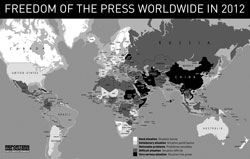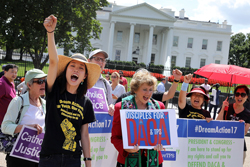What are Some of the Risks and Rewards in Political Reporting in America and Abroad?
 Political journalism around the world offers unique challenges for journalists to reveal the truth to people when, in some countries, the government will do anything, including harming the journalist, in order to keep their control over the press.
Political journalism around the world offers unique challenges for journalists to reveal the truth to people when, in some countries, the government will do anything, including harming the journalist, in order to keep their control over the press.
According to the Committee to Protect Journalists, in 2013 alone, 13 journalists were killed around the world and 62 percent of the 13 journalists were covering politics. In 2012, 232 journalists were imprisoned around the world, according to the Committee to Protect Journalists.
In the past decade, the most dangerous place for journalists has been Iraq. According to the Committee to Protect Journalists, around 89 media people were murdered and another 50 died in crossfire or other acts of war between the start of the U.S.-led invasion of Iraq in 2003 and 2010.
According to the Committee to Protect Journalists, in 2011, during the turmoil of the Arab Spring, at least 33 journalists and media personnel were killed: One in Algeria, one in Bahrain, two in Egypt, one in Iran, 11 in Iraq, six in Libya, one in Syria, one in Tunisia, five in Yemen, and four in Somalia.
Dr. Eleanor Novek, associate professor of communication, said that Congress shall not suppress the press, but does not have to support it. For example, Novek said that England has a state supported press which means that the newspapers do not have to raise revenue. However, the downside is that there is censorship.
According to Novek, some countries worry about the role of the press and security. “When countries identify journalists as threats to say security, then it [the government] feels entitled to imprison them, exile or even kill them,” said Novek.
Novek believes that in some countries such as the United States, there is corporate pressure for self-censorship. She said that some of the publications are even owned by larger corporations which can decide what information is published.
Novek said that governments may even force journalists to reveal sources.
“Journalists know more than the government or law enforcement and have been pressured into revealing sources,” added Novek.
Dr. Saliba Sarsar, professor of the political science department, said, “Obviously, the media plays a crucial role and a free media is essential for the freedom of expression. More often than not, if it were not for the media, instances of human rights abuses, corruption, illegal activities, among others, would not be uncovered.”
Sarsar also said that if the media is protected, it makes society much more informed. “While the media must do its job responsibly, freedom of expression must be guaranteed. It is a fundamental right, necessary for the actualization of other human rights. Media personnel must be protected so that they can do their job. It behooves governments in particular and people in general to enable the media to do its job.”
Dr. Michele Grillo, assistant professor in the criminal justice department, said that the Middle East is one of the most dangerous places to report because of the misconception that journalists are lying.
“Due to the information people received in the Middle East, it is no wonder a large portion saw the United States as ‘bad’ and trying to take over the world. It is a strategy to help gain the support of the citizens. Furthermore, governments such as in Libya, Syria and Egypt do not want the world to see how they handle the civil unrest which usually includes force and violence,” said Grillo.
In some countries, journalists are not received with positive reactions.
Grillo said, “In general, journalists may not be allowed to enter a country or once entry is gained, allowed near the site/city, etc. in order to cover the story. Usually, in cases of civil unrest, rebels want to journalist’s presence in order to help their cause through reporting of the issues, as well as loss of life.”
Another spot that Grillo said is dangerous for journalists is North Korea.
“North Korea, under new leadership of President Kim Jong Un, recently stepped up its defense systems, testing missiles and potentially nuclear war heads. Any outsider trying to get too close to report on these developments risks dangers such as imprisonment,” said Grillo.
Adrian Palaia, junior political science major, traveled to China and said that the attitude towards the press is completely different. “It is simply more beneficial for the government to use the media as a mouthpiece rather than let it function independently,” said Palaia.
Palaia said that the press ends up being the truth-seekers in most countries but in some that is not the case. “When there is injustice, people deserve to know. When a government, an institution made to protect and serve its population, commits those injustices, correction only comes from the outside,” said Palaia.
IMAGE TAKEN from www.nationsonline.org


